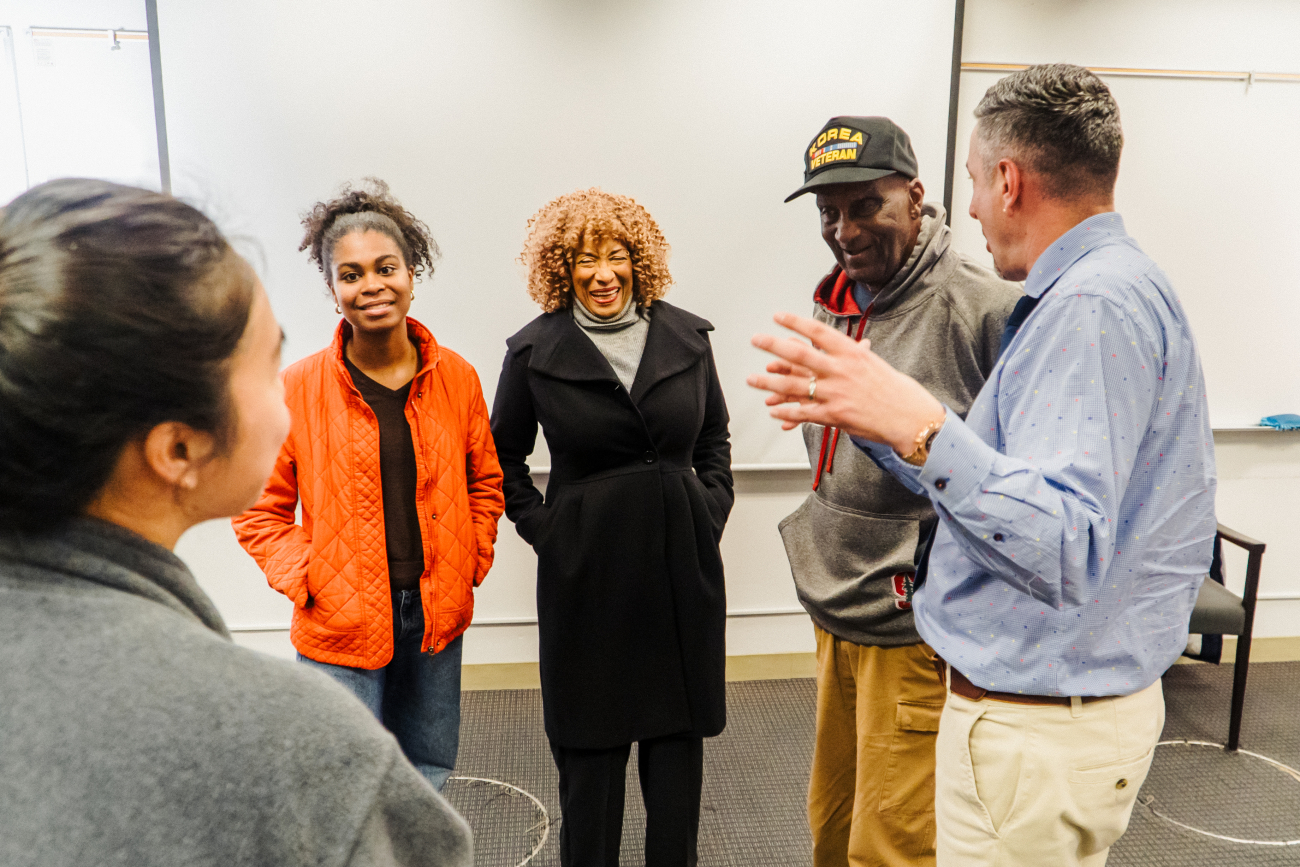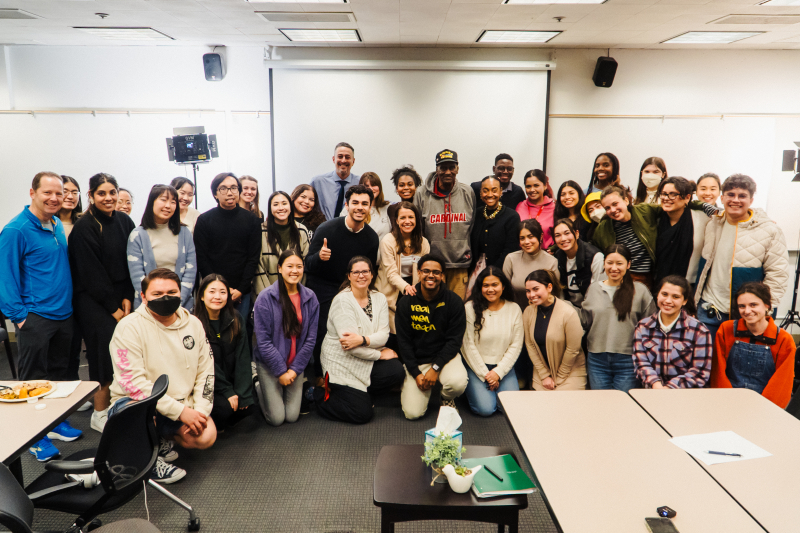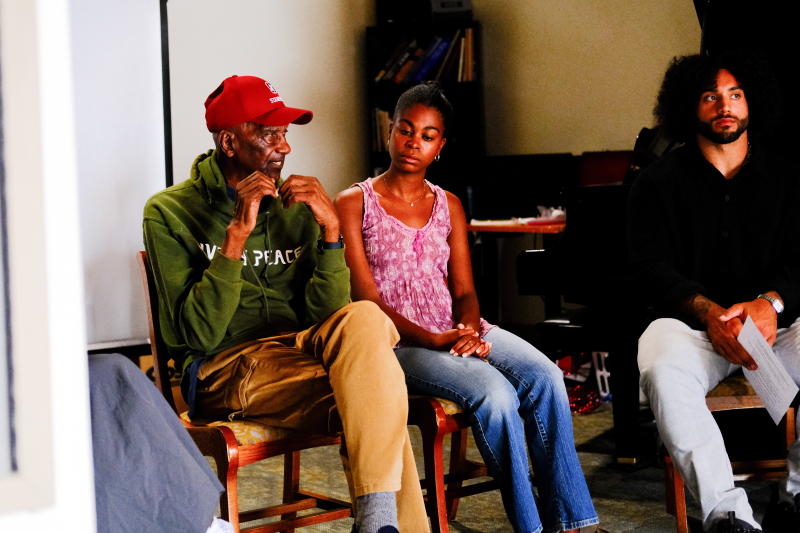
New program brings distinguished community education leaders to Stanford
What does it mean to live a life in service to education?
In the example of Robert “Bob” Hoover — the inaugural Distinguished Practitioner in Residence at the Stanford Accelerator for Learning — it’s about tapping into community partnerships, helping to build institutions of learning, and empowering students through knowledge.
“All of our kids are capable and deserve a quality education, so our job as educators is to provide that,” says Hoover, director of the SWAG Program at Live In Peace, a nonprofit that supports young people in East Palo Alto through coaching, counseling, tutoring and mentorship.
The Distinguished Practitioner in Residence, a role within the Equity in Learning Initiative at the Accelerator, was launched in the 2024-2025 academic year to introduce Stanford students and scholars to exemplars in the field of education outside of the university, recognizing the expertise that comes from the broader community. A cornerstone of the Accelerator is collaborating across sectors to get the best possible learning outcomes. During his time in the role, Hoover met with students across campus sharing his experience and perspectives.
This year, the Accelerator welcomes two new practitioners in residence: Aditi Goel, who has more than 20 years of experience in educational policy and nonprofit work; and Olatunde Sobomehin, CEO and co-founder of StreetCode Academy, a nonprofit that provides free tech classes to communities of color.
“I learned how important it is to have intergenerational conversations about issues in education,” said Maisha Winn, the Excellence in Learning Professor at Stanford Graduate School of Education and faculty director of the Equity in Learning Initiative.
Education as a collaborative effort
From Air Force veteran and public school board member, to academic program director and college president, Hoover has worn many hats in his 93 years. “I wanted that historical context for Stanford’s collaboration with the community,” Winn said.
After moving to California 66 years ago with a bachelor’s degree in physical education from Pennsylvania State University, Hoover received his physical therapy certificate from Stanford, his California teaching credential from San Jose State University, and his master’s degree in education administration from Antioch University.

However, Hoover says that his greatest lessons came from the community around him.
“An amazing factor in my development was that the school I went to had an expectation that everyone was prepared to go to college,” said Hoover, who grew up in North Carolina during the Jim Crow era. “The teachers in our school were so highly motivated to make sure the students got a good education that they reached out to my mother in Pennsylvania whenever I wasn’t doing well, to ensure I made it to my classes.”
These experiences drove him to support the advancement of Black and Brown students in the Bay Area as a community organizer, the program director of college readiness at the College of San Mateo, and the first president of Nairobi College, a junior college created to meet the educational needs of people of color. He was also part of a group of 30 people who worked for 20 years to incorporate the City of East Palo Alto in 1983.
“Having gone through that environment as a kid had a huge impact on what I did as an adult,” he said.
As the Distinguished Practitioner in Residence during the past academic year, Hoover met with students, faculty and staff to share about his experiences in education, and encourage younger generations to chart their own course.
One such event was a speaking engagement hosted by Stanford undergraduate students at Ujamaa House, an African American themed dorm, on organizing for education. Taylor Hall, ‘25, who graduated with a bachelor’s degree in African American Studies and a minor in education, spearheaded the event and said she first learned of Hoover through her own education research.
“Once I embraced the idea that I wanted to pursue education as my pathway, I started taking a lot of classes on the cultural aspects of learning and cultural development in education,” said Hall, who was originally an international studies major. “It was through these classes that I first learned about Mr. Hoover and the Nairobi Day Schools.”
Hall said the purpose of the event was to encourage intergenerational conversations around organizing, give younger organizers hope within the current political climate, and honor Hoover as a veteran, Hall said.
“It was so beautiful to have so many types of people there to come and hear Mr. Hoover speak,” she said.
One of the event’s attendees was Hoover’s granddaughter and Stanford student Lena Hoover, ‘27.
“I think I’ve always viewed education as a privilege because of the amount of work my grandfather has done with advocacy and education,” said Lena Hoover, who started a program with Hoover during her first year at Stanford that sends students in Ujamaa to tutor at Live in Peace twice a week.

“He’s always talked a lot about how as we graduate and move forward, it’s important to remember to give back, whether that’s through money or time, and stay grounded in service and uplifting the community we came from,” she said.
“The biggest thing he’s taught me is the importance of having a village, because working with other people is integral to building a movement.”
Faculty mentioned in this article: Maisha Winn



